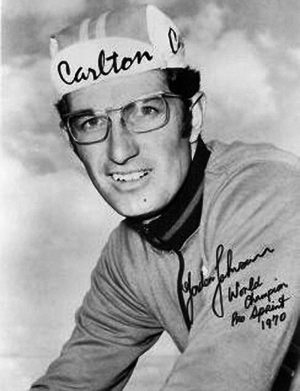
Here’s a question for you, no Googling now… ‘Who’s the World Sprint Champion?’
It’s big Dutchman, Harrie Lavreysen, of course.
But if I’d asked that question back in 1970 few would have had any hesitancy in telling me that the amateur champion was legendary Frenchman Daniel Morelon and the Professional Sprint king was Aussie, Gordon Johnson mounted on a British-made Carlton.
The Golden Days of sprinting were in the Reg Harris era of the 40’s and 50’s when huge crowds watched the greats – Harris, Derksen, Van Vliet, Gerardin, Plattner, Maspes joust for supremacy.
But the late 60’s and early 70’s were still a good time for the fast men with Grand Prixs all over Europe on big outdoor tracks drawing good crowds.
We caught up with Gordon a while back and here’s what he had to say to us.
How did you get into cycling initially, Gordon?
”My mum and dad were cyclists; my dad, ‘Tassy’ Johnson rode the Kilometre at the 1936 Berlin Olympics, my brother rode too, so conversation around the dinner table usually involved cycling – I was always going to be a cyclist.”
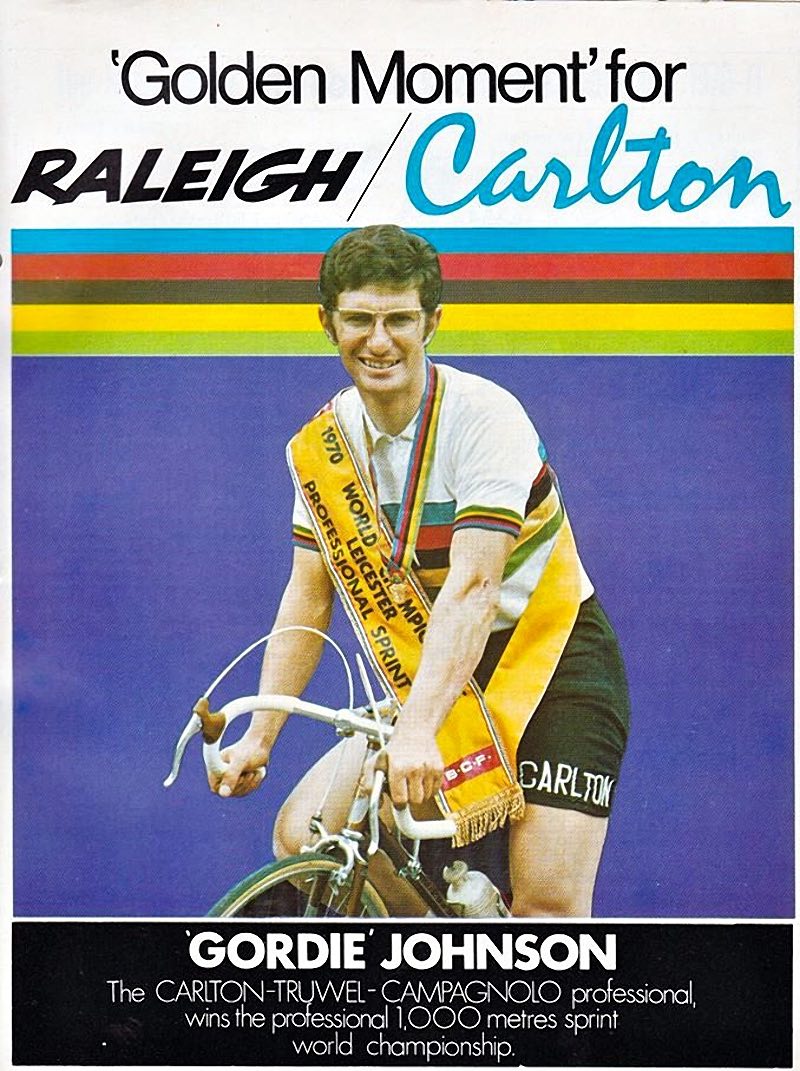
You rode two Olympic Games?
“I was only 18 years-old for Tokyo but wasn’t at my best, I’d crashed in training and my leg got infected.
“I remember leading out and this German guy going past me like I was standing still and then I went out in the repechage.
“In ’68 you were up against the likes of Frenchman Daniel Morelon and Omar Phakadze from Russia, legendary sprinters.
“For Mexico we had to come home to race in Australia to gain selection through the Australian Championships – then we all got sick, so again it wasn’t a good campaign for me.”
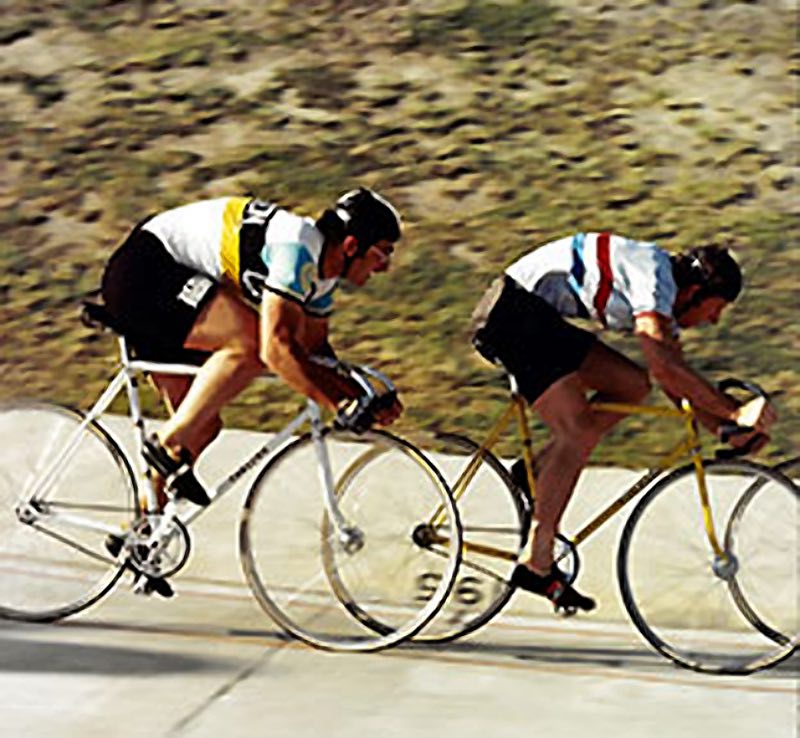
But you came away from the 1970 Commonwealth Games in Edinburgh with silver and gold…
“Yes, in the Sprint and also the Tandem with Ron Jonker; my compatriot, John Nicholson beat me in the Sprint final but the 10 Mile was the one I really wanted; I was favourite for it.
“In Australia that year I’d won titles in the Sprint, Kilometre, 10 Mile and was in the winning Team Pursuit team.
“In Australia I would go on to set an Aussie record with 28 straight pro wins in distance races and if you count my amateur years it was something like 45 wins straight in bunched events.
“The winning break in Edinburgh on the Meadowbank track went and no one would chase.
[Scotland’s Brian Temple was one of three escapees, en route silver, with Sandy Gordon doing a sterling ‘blocking job’ for his team mate, ed.]
“I asked Jonker to chase for me and he did a half lap then swung up – he told me later he had ‘no legs.’
“The Canadian guy, the late Jocelyn Lovell took his chance and deserved to win that day.”
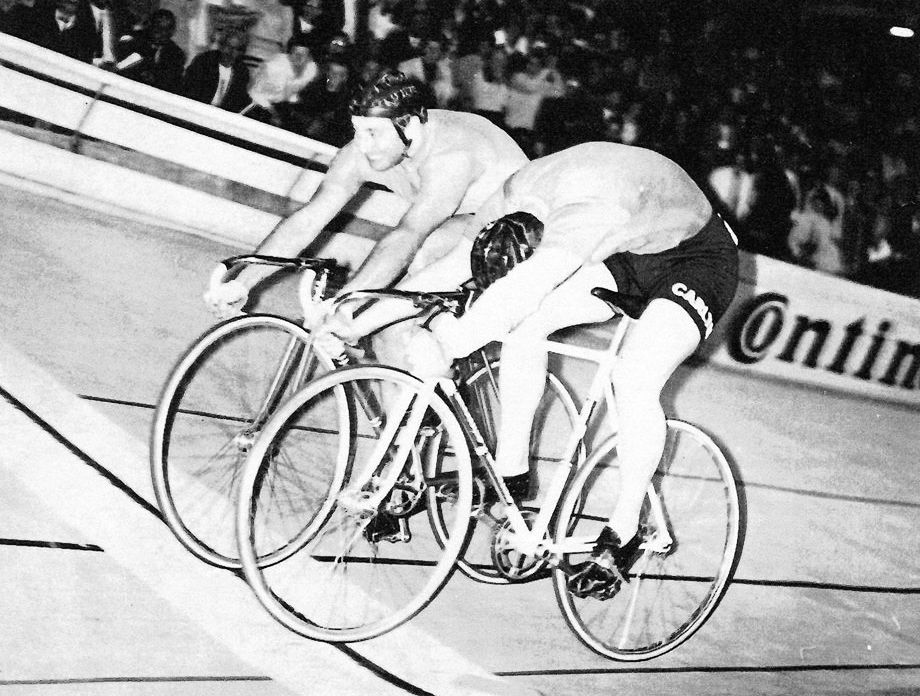
After Edinburgh you turned pro and rode to a World Pro Sprint title in Leicester?
“I’d already agreed I was going to go pro after Edinburgh but what I hadn’t realised was that if I’d won in Edinburgh then I couldn’t have turned pro for another 12 months.
“I’d come to Edinburgh perhaps a little under-done, I’d been riding the criteriums in Australia to make money and hadn’t done the track until I got to Scotland.
“For Leicester I prepared well; 30 mile bit-and-bit in the mornings, rest, five mile warm up, five sprints – I did that for three or four weeks, it was really good training and I was in good shape.
“Patrick Sercu (Belgium) was Sprint champion in 1969 but had gone to the road, Robert Van Lancker (Belgium) had been silver medallist with Sante Gaiardoni (Italy) third.
“Leijn Loevesijn (The Netherlands) had been beating Van Lancker regularly so the Dutchman was favourite – and I beat him to go through to the final.
“It was Gaiardoni I was to meet in the final; his coach, Guido Costa approached me before it and asked how much money I’d need to throw it.
“I told him; ‘not for a Mercedes Benz with the trunk full of gold bars!’”
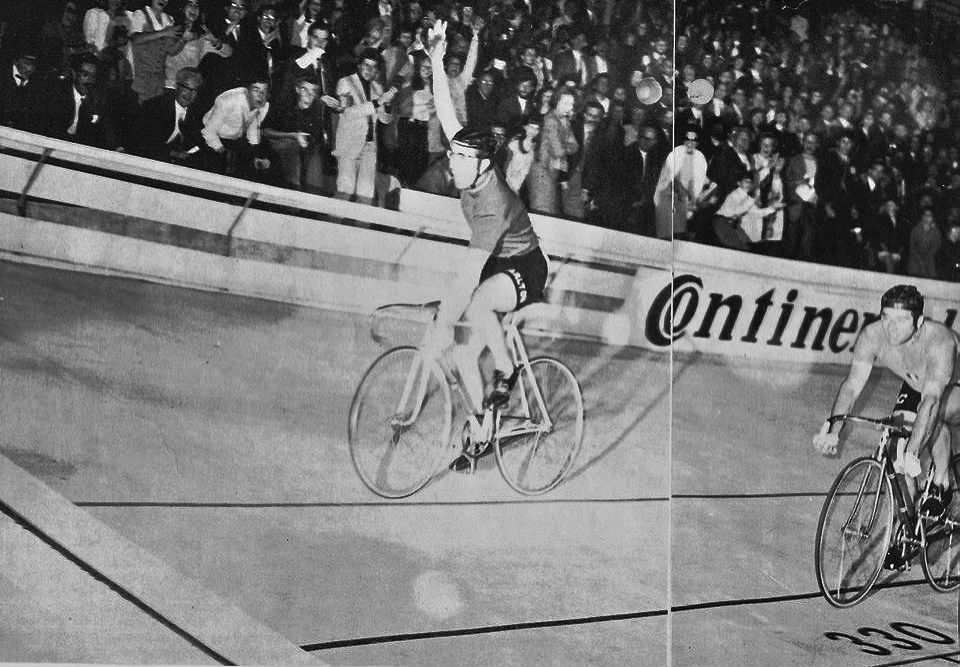
But you were declassed in Varese in ’71?
“I’d stayed in Europe over the winter, riding the Sixes, and then the Sprint Grand Prixs. I had a really good year but went off the boil three days before the Worlds.
“Loevesijn was terrific that year, he beat Van Lancker in the final; the Belgian had beat me in the semis so I was up against home boy Giardano Turrini for bronze.
“I left the door open for him, he went under me then I shut the door on him and he went down – I was looking at him laying there thinking; ‘get up you weak bastard!’
“Meanwhile, 12 or 13 thousand people are pelting me with whatever they have to hand and spitting on me.
“There was no re-run, they DQ-ed me.
“Because of the crowd going crazy – 500 of them all wanting to kill me at the exit – they skipped the controle for me and about 20 cops just got me out of there and back to the hotel.
“I skipped out of the hotel at 06:00 am the next morning.
“I rode another six or eight races in Italy – but I wasn’t popular with the crowds!”
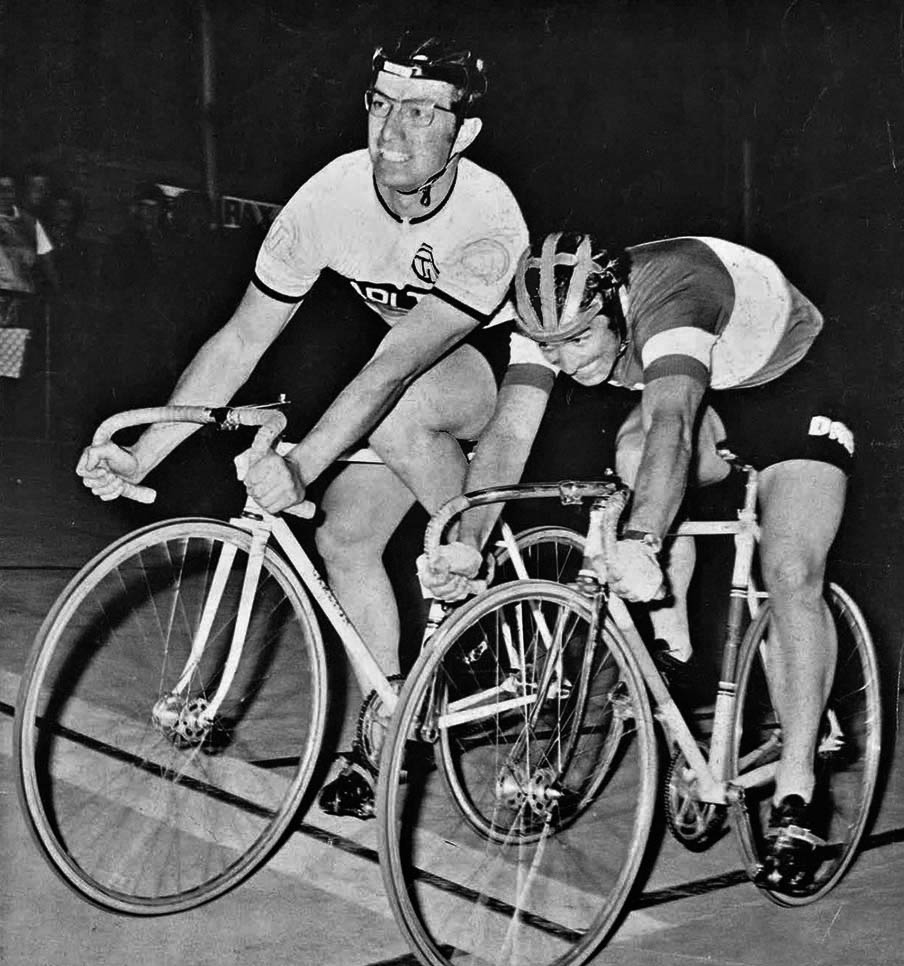
Then silver in ’72 in Marseille.
“I beat Leijn on the way through but Van Lancker beat me in the final.
“I needed a good wind up to get up to speed but Van Lancker stalled me to keep the sprints short – but looking back I think riding Six Days and criteriums had taken the edge off my acceleration.”
Was it a good living on the pro sprint circuit?
“As an amateur it cost a lot of money with travel and hotels but the prize money wasn’t great.
“But they were getting gates of five, six, eight thousand so riding as amateur you were making somebody rich.
“When I went to Carlton/Raleigh I was on a contract with a wage, car, flights paid but I was never going to live that life into middle age.
“In those days you wouldn’t end up mega rich but I did buy my house from my pro days, Raleigh paid me well.”
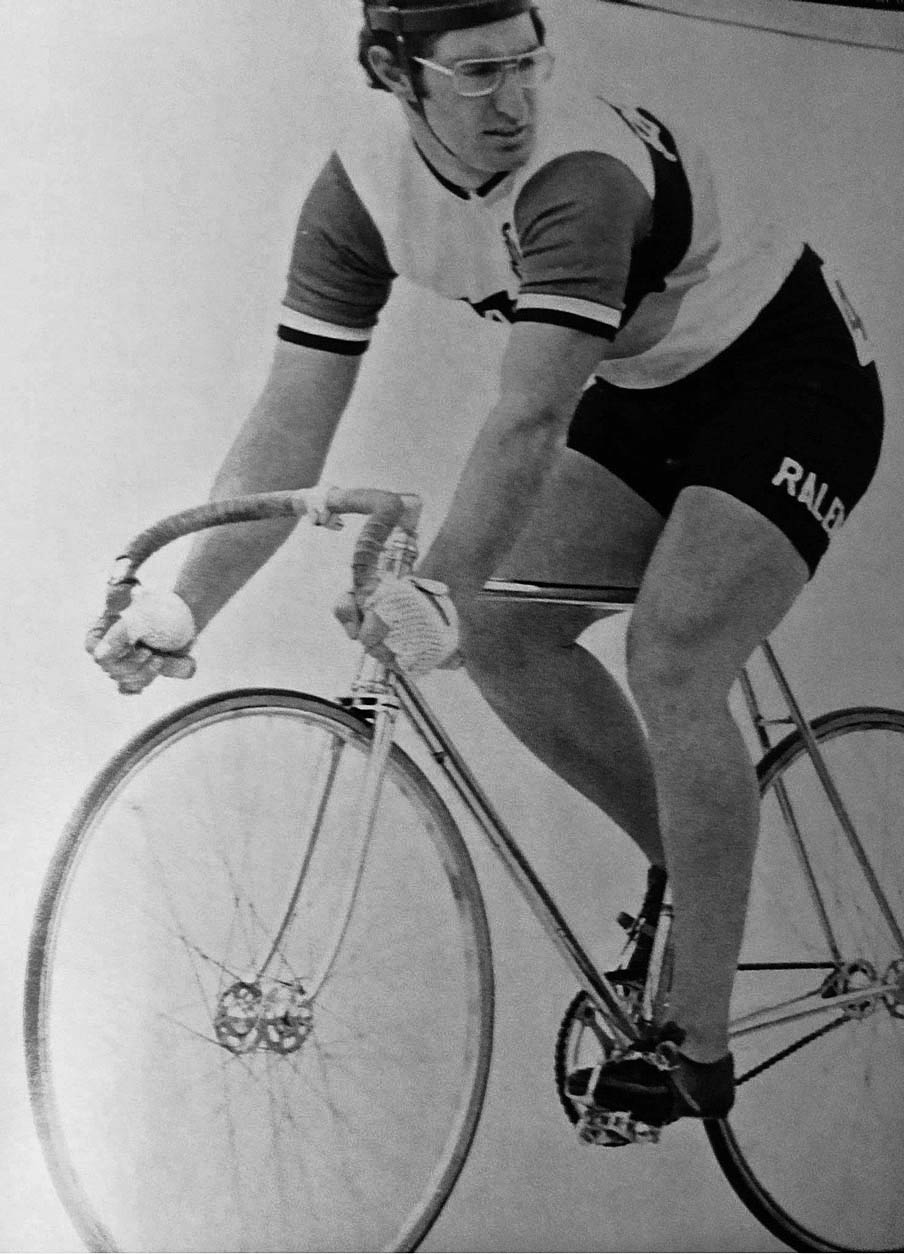
And you rode the Six Days?
“The Blue Train [select band of top riders who ruled the Six Days, ed.] worked you over in the Madisons and then the main man, Peter Post would come to you if it was a sprint event and say ‘now don’t make me look stupid here, Gordon.’
“After he been making me look stupid in the chases all night!
“One thing about the Six Days and the pro scene is that you have to learn to read people very quickly, you have to look beyond what they say – it was great life experience for me, every day I learned something new.
“Billy Bilsland, my Scottish team mate at Raleigh was a good guy and Patrick Sercu was always fair with me but I didn’t have a lot of time for Peter Post or Klaus Bugdahl; I remember the latter emptying the contents of his nose on to me in the middle of a chase.
“I rode five races on the Six Day circuit and was offered more but it was a long way to come back to ride them.
“But the thing about racing on the continent that’s different from Australia and England that I liked is that ‘local hero’ stuff where they form a supporters club for you – it gives you incentive to ride well too because if you don’t get results you’ll lose your supporter base.”
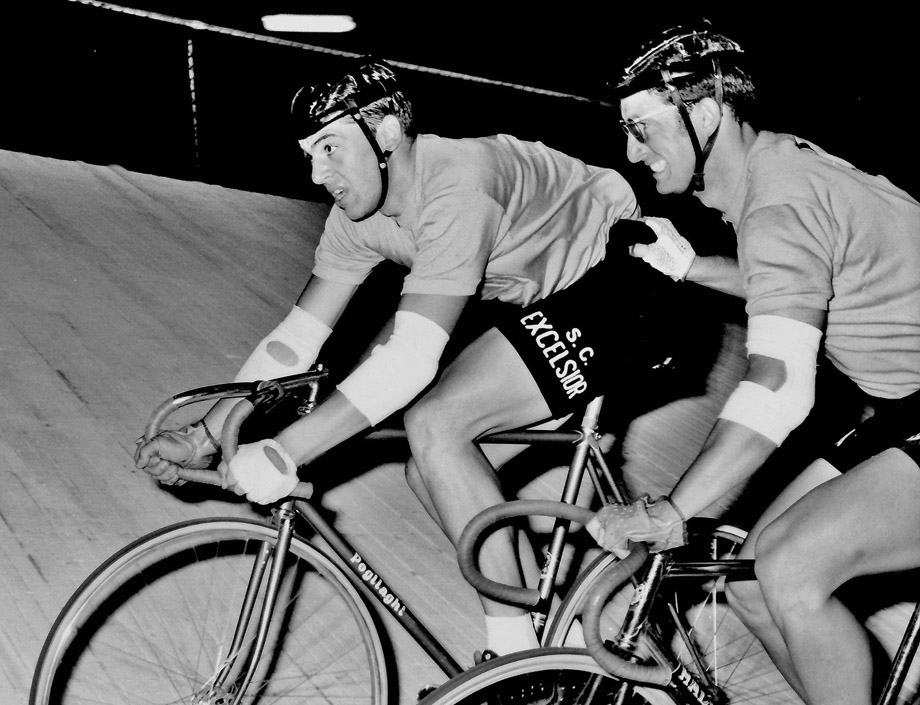
And you raced the legendary Reg Harris?
“Yes, I raced a sprint series against him in Britain, he was 51 and said to me he wanted to win.
“I told him I couldn’t do it, so he asked if could buy one heat for £500?
“I said, Reg; ‘I’m the World Champion, I can’t do that!’
“But in our first heat I was riding with these experimental cranks with carbon inserts which were supposed to aid acceleration – and in the back straight they shredded, there was carbon flying everywhere and I had to ease off and he beat me by about a half a length.
“I asked him for my £500 but he got cocky and thought he’d won fair and square so the next ride I put about 20 lengths into him.
“But he was a legend and for a man of his age he was pretty good, in his younger days he’d have been a handful.
“His comeback was good for the sport and when he bought that British sprint title from Trevor Bull, it enabled Trev to buy a car.”
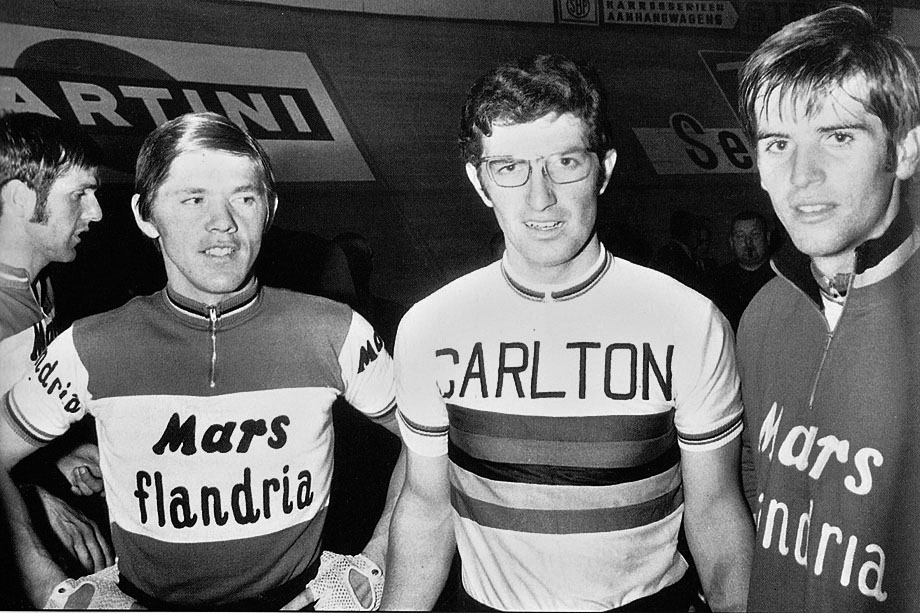
What about modern day, mega gear sprinting?
“I think that it’s gone in the wrong direction, those gears limit the tactics which you can use and the ‘no contact’ rule takes away from the essence of sprinting.
”It’s a physical sport and that was one of the things the crowd loved about it.”
Gordon Johnson, file under ‘Sprint Legend.’



